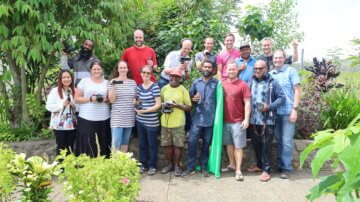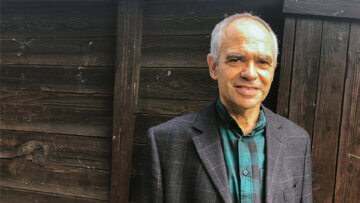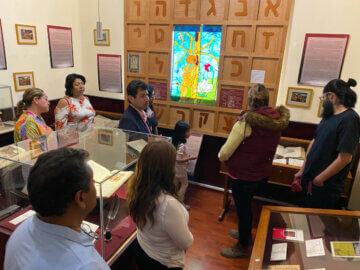Ukraine Response: Wycliffe Slovakia
As a tiny organisation in the face of an overwhelming refugee crisis, Wycliffe Slovakia is finding its role in networking with local churches and other organisations.
As of 13 March, Slovakia had received 204,000 Ukrainian refugees. For many, this is a first stop on the way further west in Europe. So the challenge for Slovakians is not only to meet the overwhelming needs, but also to keep the queue moving.

Jaroslav Tomašovský
Jaroslav Tomašovský, director of Wycliffe Slovakia, said the first wave of refugees was mostly Ukrainians coming to stay with friends and relatives who live and work in Slovakia or other countries. Now, a second wave has begun—people with no connections and no idea where to go. In the two days before this article was published, the country received 28,000 new refugees.
“Our idea is to help them to go further because there are others who are coming,” Jaro said. “We don’t want to become a traffic jam.”
Many in this next wave had first fled their home regions and gone to Zakarpatska, the southwestern region of Ukraine that borders Slovakia and Hungary. As Russian attacks come nearer and food and supplies run low, many are reluctantly on the move again, along with residents of that region. This time they are crossing into Slovakia or Hungary.
“They don’t know where to go,” Jaro said. “They just lost their houses, everything. They are like Job. In one day, they lost everything.”
Most are taking trains to the farthest-west stations, then finding whatever transportation they can—cars, buses, walking—to reach the border. Once they have been processed and admitted into Slovakia, Slovaks are going there to meet them.
“We have people who are taking them by cars to churches to stay overnight and give them food and accommodation for a while,” Jaro said. “We now are working on a system for how to distribute help to these people.”
Long Memories
Part of the reason Slovaks are so willing to help, Jaro said, is that many still remember 1968, when Warsaw Pact armies crushed the “Prague Spring” in what was then Czechoslovakia. That action took just two days, sowing seeds of the dissolution of the Soviet empire two decades later.

The first group of refugees helped by Wycliffe Slovakia members in Levice were Nigerian university students who fled from Kharkiv, Ukraine. They stayed overnight and then continued to Bratislava.
“There are still many people, like my parents, who remember that time,” Jaro said. “So we somehow can feel how the Ukrainian people feel. In our case, there was no war. It was so quick and so sudden that we didn't have time to prepare or do anything about it. But we really have compassion with Ukrainians. This common experience, this common history somehow unites us.”
Jaro’s wife, Saska, serves as the Wycliffe Slovakia’s HR assistant. Based in Levice in the southwest, they are the only in-country staff; other members work in Bible translation projects around the world. But Jaro has numerous church connections in Slovakia that are proving valuable in networking relief efforts. He was a pastor for nine years, and from his university years he knows many other Slovak pastors from multiple denominations.
“We see our role (both for their organisation and for their country) mainly as being a channel or corridor for people who are coming in big stress, to help them calm down and have some time to think,” he said. “And then help them to go further and find places where they can stay a long time. Maybe to the Czech Republic or other countries that are further to the west.”
Prayer needs
“My prayer is that all this pain would bring something really good to God’s Kingdom for God’s glory,” Jaro said. “That his children will unite more and work more closely.”
He mentioned these specific points for prayer:
- Trauma healing: “We as Wycliffe Slovakia are trying to use our resources to help churches. One of our members serves as a scripture use worker, consultant (in another country). She is trained in different areas of Scripture use, and one of them is trauma healing. So we are communicating with her how we can use her skills and knowledge to help churches here in Slovakia to help those who are coming and who are wounded, traumatized. We are thinking about how she can make an online course for those who would be interested. Pray for the online workshop we plan to do—that it would work, and be available in such a way that it can be multiplied, so people can then offer the workshop to others.”
- Language learning: “I got some materials from Wycliffe Germany. They have prepared materials for churches to help refugees to learn German. We want to help churches teach them the Slovak language here, so they will be able to communicate. It should work, because our languages are relative languages. We want to help churches to be prepared and to have something to know how to do on their own, without needing language teachers. These materials are designed in such a way that even a person who is not trained as a Slovak second-language teacher can teach someone else to speak Slovak. So at the moment we are working hard on this, so it can be available to our churches. Pray that we could be quick with our process so this material can be available as soon as possible.”
- Continued collaboration: “We are in good connection with other Wycliffe organizations, like in Poland, Romania and Hungary, and we share what we already have. Zsuzsa Zentai (Wycliffe Hungary director) designed a small card about the Bible app in Ukrainian and Russian languages. Then she was so kind to say, ‘I can do this for you guys from other organizations.’ So I sent her our logo and she changed the card for us. I have already distributed these cards to all the churches in Slovakia, so they can print them for themselves and use them. Two people don’t need to do the same thing. We can share this.”
Wycliffe Slovakia: wycliffe.sk
Story: Jim Killam, Wycliffe Global Alliance
Related story soon: Slovakia’s Roma communities welcome Ukraine’s Roma.
The latest
View all articles
Informing, teaching, inspiring: PNG workshop teaches video storytelling for language communities
PNG workshop teaches video storytelling for language communities
Read more
Looking ahead at 2024
As the year unfolds, we marvel at the work of God in our rapidly changing world. And, we look forward to a number of gatherings and conversations intended to draw us together.
Read more
Telling the Bible's Story
It may come as a surprise that a museum is among the Wycliffe Global Alliance organisations.
Read more